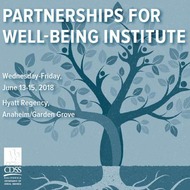B14 Continuum of Care Reform: A County’s Experience Building Partnerships and Child and Family Team Meetings; Part 2
(View Complete Item Description)This workshop will provide information on collaboration efforts between public agencies and community partners to effectively implement the Continuum of Care Reform (CCR) initiative. It will discuss the collaborative relationships among Child Welfare Services; Mental Health; Probation; TulareWORKS; Tulare County Office of Education and Parenting Network (parent partners). The workshop will also discuss the implementation of Child and Family Team (CFT) meetings in Tulare County that started with a pilot program in 2016.
Material Type: Lecture Notes




















